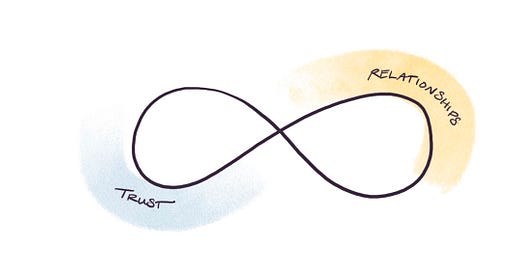People tend to say that “relationships are built on trust.” But I find that relationships and trust are more of a continuum. Relationships definitely require trust, but you can also build trust through relationships.
When it comes to design systems, people adopt what they trust. And that trust is significantly bolstered by relationships.
I’ve supported the adoption of Material Design in Google’s products ever since 2018. Back then, I started on the team with the specific goal of rolling out Google Material (the flavor of Material Design that was specific to Google) to all of Google’s products. At that time, we had a company-wide OKR to make that goal a reality, which meant we could go to individual product teams like Search, Maps, and Gmail and “require” them to use Material in all parts of their UI.
But the problem is: mandates don’t really work that well, especially at a place like Google where top-down isn’t how most things begin. Sure, mandates can work. But at what cost? I found that by requiring (nay, demanding!) teams to implement Material, no matter how nice we were about it, we earned a lot of mistrust. Our team came off as tone-deaf because we implied that what was important to us should also be important to the adopting team. We seemingly had no empathy for:
The adopting team’s other existing priorities – priorities which had been carefully considered and slotted in at the correct level of importance, and often ranked much higher than work that seemed like a nice-to-have, not a need-to-have, for success.
The challenges they’d inevitably encounter while applying Material to their own specific use cases – challenges that the Material team hadn’t encountered while designing the system, and hadn’t necessarily solved for at scale.
The sheer amount of time it would take to execute on the ask.
We were asking for a lot, which added up to significant frustration and mistrust. And let me tell you: institutional memory is long. Which means the mistrust we unwittingly built lasted a very long time. In fact I still come across people at Google who approach Material Design’s requests with deep skepticism because they remember how we once upended their roadmaps with requirements that felt like they came out of left field, creating a situation that was frustrating for them.
By the end of that year, we had done the near-impossible: wrangled over a hundred teams to deliver on the promise of our product UI looking and feeing cohesive, aligned with the company’s beautifully-branded design system. It was a success!
But looking back, while the OKR and mandate got us to the finish line, the journey left a residue of resentment. What I've learned, and what I try to bring to all collaborations now, is that forming relationships allows you to build trust which leads to greater agreement on the goals, problems, and the way forward.
Instead of leading with a directive, Material Design could have started by truly understanding the priorities, challenges, and timelines of each product team. We could have fostered a sense of partnership, acknowledging their blockers and being mindful of their needs. By showing empathy for their specific contexts, we could have built bridges of trust and been met with less resistance.
Imagine a different scenario: one where we approached each team not with a requirement, but with curiosity. "Tell us about your biggest challenges. How might a system like Material help you achieve your goals? Where are you seeing friction or inconsistencies in your user experience? What should we be building into the system to make your life easier?"
By starting with their needs, we would have demonstrated that we valued their work and their perspectives. This, in turn, would have made them more receptive to adopting Material Design, not as an imposed burden but as a potential solution to their problems.
How it applies: When you prioritize building relationships and earning trust, adoption (of anything, not just design systems!) isn't a forced requirement; it's a collaborative journey. And while mandates might deliver short-term wins, the trust you cultivate through genuine connection yields long-term loyalty and far more sustainable impact. When your partners believe that you really can go farther together, they’ll come knocking on your door asking for help, rather than pretend not to be home when you come knocking on theirs.



